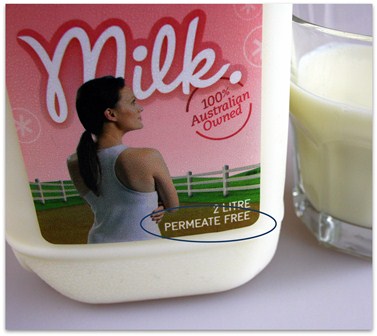Milk Permeate - The Unfiltered Truth

Milk permeate is an issue which is running hot in the TV, newspapers and Social Media at the moment. So what’s the whole truth and what’s the “filtered” truth and more importantly from my point of view, what’s the REAL issue here.
First of all what is permeate?
Milk permeate is produced during a process called ultrafiltration. This process separates the lactose, vitamins and minerals from the milk protein. Permeate is a technical term for the lactose, vitamin and mineral components extracted from milk. It consists mainly of lactose (between 65% to 85%) and has often been regarded something of a "problem" - dairy producers didn't have a use for it! It sounds like something we shouldn’t be putting into our bodies. But permeate is not harmful - you already consume it whenever you drink milk.
What is it used for?
For a while now some milk manufacturers have been standardising their milk with permeate which is much cheaper than whole milk and so represents a huge cost-saving, especially when the two big supermarkets are pushing prices down with their own milk brands.
It's a way to utilise ALL the components of milk and provide a consistent product from season to season even though the fat content say may vary over time.
The composition of milk is regulated by the Food Standards Code and milk manufacturers may alter the composition of milk as long as it stays within the Code’s limits.
Milk composition is altered for a variety of legitimate reasons such as producing low fat, no fat, fat-modified, calcium-boosted or high-protein varieties. It is also used to “standardise” the milk. The quality of milk changes through the seasons. When we were kids we used love the spring milk which was rich and extra creamy due to the increased lushness of the pastures. Manufacturers, however, want a standardised product and they told Choice when they investigated permeate use that “standardisation ensures all milk has a consistent composition”. And that’s why they use permeate to dilute the milk.
So what’s the REAL problem?
We think the REAL problem with permeate doesn’t lie with its use, or its composition or the fact that it was once considered "excess". The problem we have with it is that consumers don’t know they buying it. Now niche milk companies are cashing in on this with claims that their milk is "permeate-free" and you'll pay a premium for it (see example below).
Honesty in labelling

Dairy producers tell me that they don't add permeate all year round and that's why it doesn't appear on labels - too much trouble as they'd have to regularly change the label.
We have a right to know what’s in our food so that we can make informed decisions. If we’re prepared to pay more for whole milk that really is whole milk that should be our choice.
If we want to buy the cheaper alternatives we have a right know how much is milk and how much is permeate.
See also
- My FAQ on What’s permeate?
- Read this balanced overview from The Leader newspaper with a handy list of who owns which dairy company.







